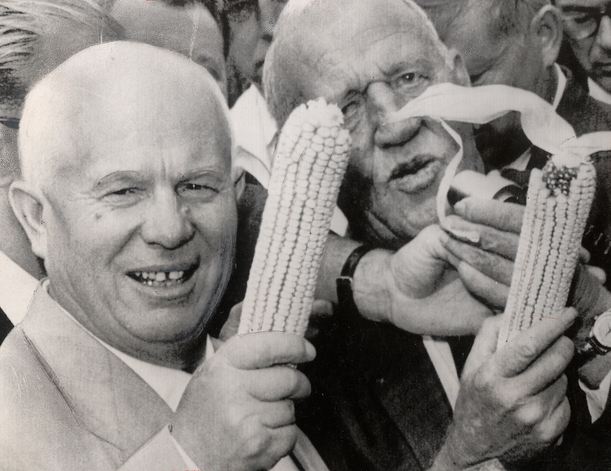During Khrushchev's time at the helm, which lasted to 1964, life in the Soviet Union was much less harsh than it had been under Stalin.
在赫魯曉夫的統治時期,也就是1964年之前,蘇聯人民的生活和斯大林時期相比不那么艱難了
Khrushchev instigated no purges, production of consumer goods was increased and apartment buildings began to sprout up instead of factories.
赫魯曉夫并不煽動大清洗運動,消費品的生產增加了,很多公寓樓而不是工廠開始拔地而起
The USSR also made well meaning attempts to mend fences with communist rivals in Yugoslavia and Red China.
在南斯拉夫和中國,蘇聯還做出了有意義的嘗試來修補對于共產主義敵人的防御
The sudden end to the bloody stalemate in Korea just after Stalin's death was no accident, but for all the friendly public relations initiatives,
斯大林死后,朝鮮出現的血腥的僵局并不是意外的狀態,但盡管發起這一切友好的公共關系的措施
Khrushchev's USSR was still welded to the old Stalinist goals of military superiority and fostering world revolution.
赫魯曉夫領導下的蘇聯仍緊緊和舊的斯大林的目標相關,即軍事優勢和孕育世界革命

For all of his bluster Khrushchev himself was a dangerous foe who believed implicitly in the triumph of communism,
鑒于他咄咄逼人的聲勢,赫魯曉夫自己是一個危險的敵人,他暗中相信共產主義的勝利
he believed it would happen in 1980.
他覺得勝利會在1980年到來
Once the USSR had built its first nuclear bomb and blew it up in 1949,
一旦蘇聯制成了其首枚核彈并在1949年成功爆炸
the arms race boiled down to developing more effective means of delivering the deadly goods.
軍備競賽就濃縮于開發運送這種致命武器的更有效的方式上
The US and its allies originally favoured long range bombers while the soviets experimented with rockets.
美國極其盟國起初喜歡遠程導彈,而蘇聯卻研究火箭












